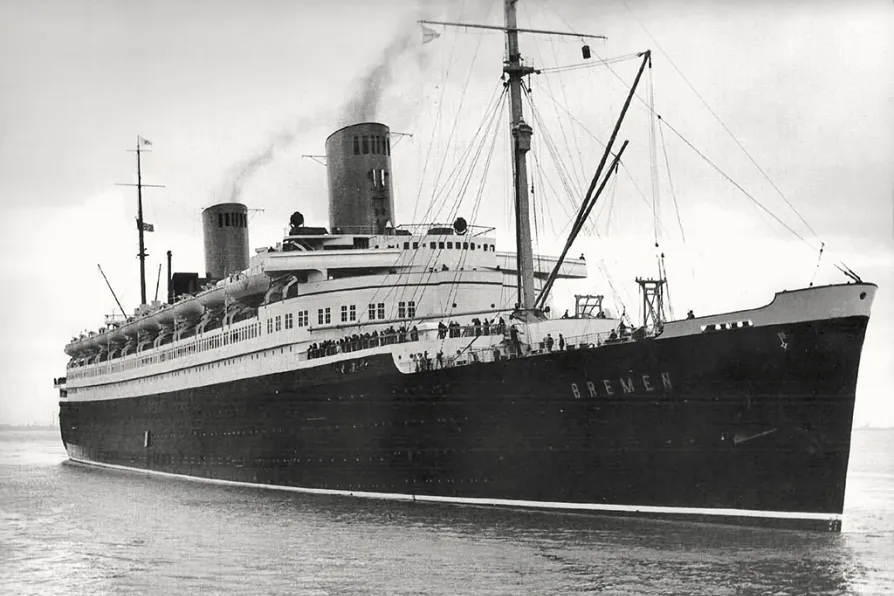Rubio's disturbing speech in Munich exposed the West's brutal plans — more imperialism, more colonialism, more white supremacy, says ROGER McKENZIE
DAVID HORSLEY remembers communist seaman Bill Bailey, the ‘Kid from Hoboken,’ whose heroics in tearing down a swastika flag from a ship’s mast inspired early anti-fascist resistance

 The SS Bremen
The SS Bremen
NINETY years ago in July 1935, the German ship Bremen had docked on the Hudson River in New York City. The presence of the ship was as propaganda for the Nazi regime, inviting New Yorkers on board to look around the vessel.
There was great unrest among many in the city, especially at the sight of the swastika flag flying high from the Bremen’s mast.
Huge crowds gathered at the pier head with banners denouncing fascism and calling for the freedom of imprisoned Communist leader Ernst Thalmann. At the same time, a small group of communist seamen in New York made a plan.
They made their way on to the ship, posing as interested visitors looking over the ship and then headed to the area of the ship where the mast stood.
German seamen attempted to stop them and a number of fights broke out and in the midst of this, Bill Bailey, a leading seaman, clambered up the ropes to the mast head — his mission to haul down the hated swastika flag in full sight of the demonstrators who were now cheering him on as he climbed higher.
In Bailey’s own words from his autobiography, The Kid From Hoboken: “I grabbed the swastika and started to pull. The banner at first resisted and then I heard it ripping along the seam. Time was getting short. Goddam that flag! It seemed to be stronger than canvas. I had to be careful; one misstep and I would be over the side and in the Hudson River. But in the next second I recognised one of our guys Adrian Duffy, a short wiry seaman. ‘Hold the bastard tight,’ he shouted. A snap of a switchblade, a quick slash at the rope and the flag was free. Quickly I tossed it overboard as the roar of the crowd reached a deafening crescendo.”
Bailey and his comrades were beaten up by the German crew and then arrested by the police who had climbed aboard.
Dragged down to police headquarters, they expected more beating as the police were notorious red-haters who regarded most communists in the city to be Jewish. But when names such as McCormick were given and the men were found to be of Irish heritage and from Catholic backgrounds, the police, who were themselves Irish Catholics, laid off the beatings.
Outside the building a huge crowd gathered demanding the prisoners’ freedom. Released on bail, Bailey and the others spoke at meetings to raise money for their forthcoming trial.
In Bailey’s own words, “A meeting at Madison Square Gardens filled the auditorium with 20,000 people. It was a fantastic experience speaking before such a large gathering. The ovation lasted 13 minutes. For the next several weeks I spoke at two meetings a day gathering funds and support for the coming trial.”
Eventually they were all freed after the outstanding defence lawyer Vito Marcantonio’s words: “If anyone should be charged before this court it should be the Nazis for destroying the human rights of the German people, for destroying the trade unions, destroying political parties and subjecting the Jewish people to lives of terror and concentration camps.”
This event was a major early sign of anti-fascist resistance and soon after in Brazil an anti-Nazi rally tore down the swastika from the German consulate building.
Bailey went on to join the International Brigade in Spain, serving in the Lincoln Battalion in which seamen made up the largest contingent of US volunteers. He is featured in a wonderful film on the Lincoln Battalion, The Good Fight, and his autobigraphy The Kid From Hoboken is available free online.
Bailey served in the merchant navy during World War II and was then blacklisted for many years because of his politics.
His political views never changed, although he left the Communist Party in the 1950s but continued fighting for trade union rights, civil rights, internationalism and justice for all and remained a leading member of the veterans of the Lincoln Battalion for the rest of his life. This month let us remember this early strike against the scourge of Nazism shown by Bill Bailey and his comrades who were overwhelmingly supported by working class New Yorkers.









